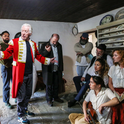The Kindly Ones
By Jonathan Littell. Published on 5th March by Chatto & Windus, £20
Prize-winning French novels rarely stir up much interest abroad, or at any rate in the English-speaking world. But The Kindly Ones (or Les Bienveillantes) caused a commotion when it carried off the 2006 Prix Goncourt, largely on account of the alleged irony that its author, Jonathan Littell, was half American.
Such distractions can now be placed to one side, because this monumentally bulky novel has finally been translated into English and it is an extraordinary work, deserving of the praise heaped upon it. That's not to say it's an easy read. Its narrator, Max Aue, is a cultured, philosophically minded, bisexual SS officer attached to various Einzatsgruppen—the mobile units responsible for executing Jews—during the second world war. Max proves to be a kind of Forrest Gump of the Holocaust, pitching up (often implausibly) at every flashpoint—the Eastern Front, Stalingrad, the camps, Hitler's bunker—and encountering most leading Nazis (including the Fuhrer, whom he bites on the nose). He relates his story in careful prose whose very flatness hints at his inner corrosion.
The novel is not without flaws—it is rambling and, for those unversed in Nazi bureaucracy, often confusing—but it triumphantly achieves its central aim, which is to inhabit the head of a man who, though by no means innately evil, willingly partakes of unspeakable deeds. The arguments Max wages with himself—and with his fellow Nazis—in order to justify his behaviour are fascinating. Slowly, over nearly 1,000 pages, we come to understand how a course of action that in retrospect looks like collective insanity seemed, to those responsible, not merely logical but in some ways moral.
William Skidelsky is literary editor of the "Observer"
Art
Contemparabia
United Arab Emirates, 15th-21st March,www.contemparabia.com
You may have heard traveller's tales of glittering cities springing from the desert, only to be obscured once more by economic sandstorms. The United Arab Emirates, however, are very keen for us to know that there is more to their new culture than a mirage of skyscrapers. They have set out to become cultural brokers for the middle eastern and south Asian region, and are inviting collectors, curators, critics, museum directors and interested fellow travellers to see what they have to offer.
Contemparabia is a week of intense cultural sightseeing, introducing visitors to cultural projects underway in the Gulf. Join a caravan of art lovers embarking from Doha, the capital of Qatar, just outside the UAE, where IM Pei's serenely beautiful Museum of Islamic Art will offer an appropriately splendid reference point. From there the party will move on to the opening of the ninth biennial (19th March-16th May) in Sharjah, the traditional capital of UAE culture, before travelling to Art Dubai (19th-21st March). A day at the end has been reserved for exploring Abu Dhabi—with its ambitious plans for the Saadiyat cultural district, or "Island of Happiness," the intended holiday home of the Guggenheim and the Louvre, as well as the base for a maritime museum and the Sheikh Zayed Museum.
For anyone with curious about the culture of the middle east, this is a tempting package. Besides the events themselves, there are the developments on the ground. Architects of the distinction of Rem Koolhaas, Norman Foster, Frank Gehry, Jean Nouvel and Zaha Hadid have been eager to accept the invitation to build here. For as Koolhaas remarks in his book about the region, Al Manakh, "The world is running out of places where it can start over."
Emma Crichton-Miller is an arts writer and journalist
Theatre
Burnt by the Sun
Directed by Howard Davies and written by Peter Flannery.
National Theatre, Lyttelton, from 3rd March, Tel: 020 7452 3000
Television dramatist Peter Flannery is making a stage comeback this month with his new play based on the 1994 Oscar-winning Russian film Burnt by the Sun, a tremendous parable of love and betrayal set on the eve of Stalin's terror.
Best known for such small box series as Blind Justice, Our Friends in the North and the recent English civil war bodice-ripper The Devil's Whore, Flannery may not enjoy the critical eminence of David Hare or David Edgar, but he too has pursued the holy grail of the "state of the nation" play. He made an exceptional RSC debut with Savage Amusement in 1978, a bleak comedy of the welfare state, and followed up with an early career of ambitiously political works, including the stage template for Our Friends in the North in 1982, which starred Jim Broadbent.
But the small screen seems to have offered greater space for Flannery's epochal tendencies. Though The Devil's Whore may have upset historical purists, it gave good value as a revalidation of revolutionary themes viewed through a contemporary prism of sexual relationships—an approach that also informs Burnt by the Sun. The original screenplay by Nikita Mikhalkov and Rustan Ibragimbekov has obvious elements of Gorky-esque stage-worthiness—the Bolshevik red army hero and his beautiful young wife are approached in their teeming dacha by a disguised White Army agent who happens to be the wife's former childhood friend and lover.
Flannery sees a connection both with the situation of "terror" in Palestine and his own predilection for painting people of passion in their political context. Now adapting back from screen to stage, this could be a significant return to the theatre for Flannery and his pitch to join the top table of British dramatists.
Michael Coveney is a theatre critic
Cinema
The Class
Directed by Laurent Cantet. On release from 27th February
Teacher and writer François Bégaudeau's 2006 novel Entre les Murs was a brilliant chronicle of a year spend in a multiracial Parisian high school. As expected, Bégaudeau found no end of problems in the school, but described how civility of discourse was a bridge-builder.
The filmmaker Laurent Cantet read the book and co-wrote a screenplay from it. He cast Bégaudeau as himself and rehearsed in a real school each Wednesday for a year. The result is The Class, a film so self-contained, so full of drama and sway, that it's as if the kids and teachers are on a boat at sea. The pupils are Chinese, African, Arab and white French. They are frank and gobby. François is the handsome captain of the ship, a young man who sees serenity in the classroom tumult, and who spins the kids' verbal brickbats and overtures into something graceful. No film since Patrice Leconte's Ridicule has cared so much about language, how it can hurt or heal, yet The Class is naturally cinematic. It was last year's Palme d'Or winner and has a shot at the best foreign film Oscar—though it may be too original for Hollywood.
Some movies—It's a Wonderful Life, or the school-room documentary Être et Avoir—grip audiences in a mysterious way. The Class does too. Cantet filmed in long, unobtrusive takes, with several cameras all on one side of the classroom, each trained on a different character so that he could capture every emotional encounter, every hint of wounded pride, every riposte. I saw it in Cannes with 2,000 film critics, and we were all on that boat, enthralled at the near mutiny of the crew. So vivid are the scenes that we thought the film must be a documentary, but it's not. The kids are playing scenes from Bégaudeau's book, not themselves exactly. Call the result cine-role play. Call it a gift from God to the teaching profession. Call it one of the best films you'll ever see.
Everyone knows that school is a theatre. The Class mines the dramatic potential of an acutely observed and crafted reality. It's a work of humanism to rank with the best of Satyajit Ray or William Wyler. It's why I love cinema.
Mark Cousins is the author of the collection "Widescreen" (Wallflower Press)
Music
Total Immersion: Iannis Xenakis
Barbican Centre, 7th March, Tel: 0845 120 7596, www.barbican.org.uk
The postwar period produced a school of radical composers, determined to recreate music from scratch, but none was so intransigent as Iannis Xenakis, whose work is celebrated in an all-day programme of concerts, films and talks promoted by the BBC at the Barbican Centre in London. Having lost an eye fighting for the communist resistance in Greece during the second world war, Xenakis settled in France, where his training as an engineer won him a job in Le Corbusier's office.
There he was entrusted with a leading role in one of the defining buildings of the modernist era, the convent at La Tourette. His music emerged from a strange alliance with his preoccupations as engineer and mathematician. The result, Metastasis, which burst on an astonished musical world in 1954, was completely unprecedented.
Rather than composing, Xenakis "sculpted" music, using mathematical tools. Architecture is often described as "frozen music," but with Xenakis it's the other way about. His music often seems like molten architecture, a collision of lines, planes and densities. But not always. This "Total Immersion" day begins with music for a glittering array of percussion, which shows how Xenakis uses group theory and durational "sieves" to create something simple and elemental, like some half-forgotten ritual. That quality will also be there in the main evening concert, performed by pianist Rolf Hind and trombonist Christian Lindberg alongside the BBC Symphony Orchestra and Chorus, and the BBC Singers. Here the portrait is rounded out with other things: political protest in the choral piece Nuits, folk melodies in Antikhthon, mysterious curved aural spaces in Metastasis, wild energy in Tracées. The combination of all these things is unique in music, and utterly compelling.
Ivan Hewett writes on music
Alexander Linklater, Prospect's associate editor, curates the Prospect Recommends feature.











